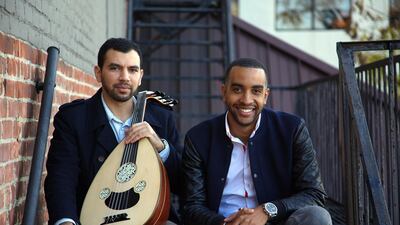It was politics, not music, which first inspired the daring blur of Arabic tradition, jazz improvisation and Caribbean groove that drives Insula, the trio who perform for the first time in Dubai and Abu Dhabi on April 14 and 16 respectively.
At the project's conceptual core is Martinican pianist Maher Beauroy and Franco-Algerian oud player Redha Benabdallah, whose distinct musical upbringings created the conditions for the project's fusions. But long before picking up their instruments, they bonded over shared socio-political beliefs shaped by the shadows of colonialism.
The pair, both aged 30 today, met in 2008 while studying musicology at the Paris-Sorbonne University. Beauroy had recently arrived from Martinique, a French territory in the Caribbean, while Benabdallah grew up in a small French city following his family's move from Algiers when he was three months old. They found an easy kinship in their experiences as minorities on the fringes of mainstream French culture.
“We became friends pretty quickly, but the music came into our relationship later,” says Beauroy. “First, we had discussions about what we read and how education is built – Insula is still about education today.”
Beauroy told Benabdallah about the book his father gave him before setting off for France, Black Skin, White Masks (1952), a study of racism and dehumanisation by Martinican philosopher, writer and revolutionary Frantz Fanon. A connection was struck. Fanon's second major work, A Dying Colonialism (1959), analyses the Algerian War of Independence. When Beauroy and Benabdallah got around to playing together, more than any musician or tradition it was Fanon they took as their intellectual stimulus.
“We felt the same thing, and that debate fed into the project,” says Beauroy. “We composed all this music and realised how really our goal is very close to Fanon’s goal – to put everybody on the same level, not dominating the other – so the idea was to transpose that thinking into a musical way.”
Sitting around the piano, they soon discovered their sociological experiences were mirrored musically in ways they did not anticipate. The Creole scales and rhythms of Beauroy's youth often fitted intuitively with those of Benabdallah's Maghreb heritage. Very quickly, an explanation presented itself.
“Between Algeria and the Caribbean, it was surprising to find we had all this familiar musical language, it came so naturally,” said Beauroy. “Then we realised: Redha and I are connected through the African continent – we discovered, step by step, all these things we had in common. Then the goal came to try and make the audience realise the same thing.”
After a well-received debut as a one-off, unnamed duet at Martinique’s Biguine Jazz Festival in 2015, the pair realised three things: they should do this again, but that they needed a third member to drive the groove – and they needed a name. Thus, Insula was born. Gigs on all five continents have followed – including a stint at the prestigious Blue Note Rio, the Brazilian outpost of the classic Manhattan jazz club.
The final piece of the puzzle came late last year with the recruitment of Brazilian percussionist Adriano Tenorio, who lends the music its pulse with congas, a drum kit and makeshift instruments including drinks bottles, keys and children's toys. "Adriano can find music in every single object," says Beauroy. "He brings so much power – thanks to him, the music has pushed to another dimension."
While centuries-old traditions form Insula's backbone, the group's polymathy rests equally on the training and the modern, melodic know-how of its members. Before playing percussion, Tenorio was brought up as a bassist. As well as oud, Benabdallah formally studied western classical guitar and earned a PhD in musicology from the Sorbonne. And, after driving his teachers crazy with reggae-tinged interpretations of Bach, Beauroy quit classical piano studies at the age of 15 to embrace jazz – later going on to audition for Boston's Berklee College of Music, the world's largest independent contemporary music college, and a renowned incubator of US jazz talent.
During his three-year stay stateside, Beauroy took masterclasses from stars including Brad Mehldau and Robert Glasper – two of the most in-demand jazz pianists in the world – and Berklee alumni such as Esperanza Spalding and Christian Scott.
“Berklee is like Disneyland for musicians,” he says. “Musically, Berklee changed me – there was such a concentration of talent, it was crazy – my composition and playing improved tremendously.”
Since graduating in December 2017, Beauroy has had the chance to throw himself into Insula. Plans are in place to record an album later this year, and he talks about experimenting with electronic elements and new instrumentation with open-hearted enthusiasm. "This is a work in progress, there's so many ways to improve and bring new elements into what we're doing," he says. "We want to keep growing, to meet new people, to experience this music with new audiences – to really create something."
Insula perform at Alliance Française Dubai, Oud Metha, on Saturday April 14, 3pm (Dh80, see www.afdubai.org); and at Abu Dhabi Theatre on Monday April 16, 7.30pm (Dh69, see www.800tickets.com)
_________________
Read more:
Hacienda DJs to perform with symphony orchestra at Dubai Opera
Emirati composer Mohammed Fairouz dazzles New York City's Carenegie Hall
Dubai Opera to host Arabic Music Festival
_________________

